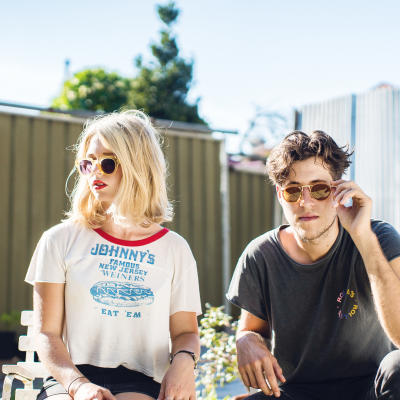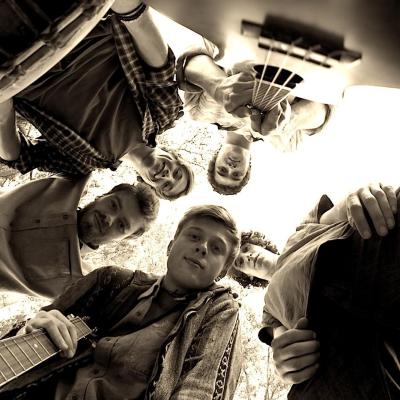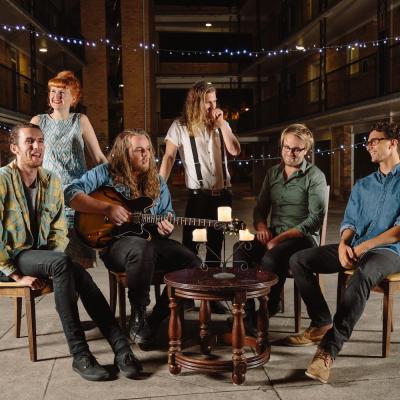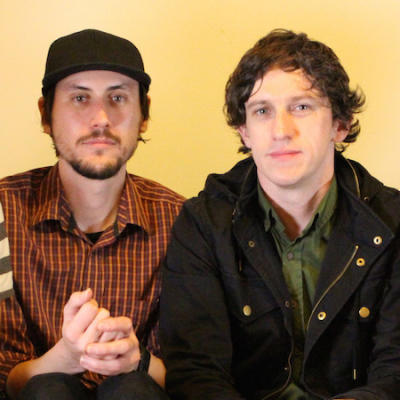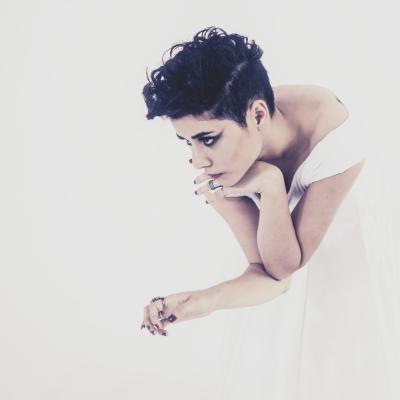Sydney-based singer-songwriter Josh Pyke has a new album, titled But for All These Shrinking Hearts, coming out at the end of July, and an upcoming tour with a little bit of a difference. I spoke to Josh to discuss his creative process, being inspired by post-apocalyptic fiction, and his opinion on the state of creative arts in Australia.
Your last couple of albums had a more extroverted folk-rock sound, whereas But for All These Shrinking Hearts sounds a bit more like a retreat. Do you think that’s the case?
A retreat… That’s really interesting. I haven’t had that comment yet. I guess I know what you mean in that there’s less straight up… jangly pop-rock songs, “Hollering Hearts,” I guess, being the exception. But then, you know, songs like “There’s a Line” and “When Your Colours Go” are more like – dare I say – adult contemporary songs… I hadn’t really given it that much thought in terms of the styles on the record ‘cause I basically just write songs and I don’t really overthink what type of songs they’re gonna be. I just write ‘em and then whatever I have is what ends up on the record… If that’s what you think, it’s all objective isn’t it?
So there was no conscious decision to make a particular set of songs in a particular style?
Yeah, I’ve never sat down to write with an agenda, ever. It’s always a thing that I really avoid doing. I started writing tracks straight after The Beginning and the End of Everything [Josh’s fourth album, released in 2013] came out and after that it was just a process of choosing the best fifteen songs that I had after a couple of years of writing to select from the album. So, it wasn’t ever a case of “Ok, now I need to have a bit more of an introspective tune” or “now I need a more upbeat song…” I’ve never done that and I find it would be kind of limiting to set out with an agenda like that when you’re writing for a record.
You mentioned that went straight back to writing after releasing your last album. Do you ever take a break from the cycle of writing, recording and touring?
I’m just constantly writing; it’s what I’ve always done. I don’t want to have a break. The only times I have a break is… either when I go through a period where I just feel uninspired, which definitely happens from time to time, or like right at this second I’m renovating my studio, so I haven’t been in the studio for three weeks. But having said that, I’ve got a couple of little ideas for songs that I’ve been noodling around at soundchecks for various things I’ve been doing. I just always write; I catalogue the ideas on my phone and then when I get a chance I refine the ideas and finish the songs.
What’s your song-writing process like? Is it a solitary or collaborative process?
It’s a bit of both. On this record in particular I actually co-wrote three of the songs, which I’ve not really done on my own records before. On this one I had about fifteen or sixteen songs that I’d written by myself, and I was really happy with them, and it was at that point that I decided to do some co-writing with some trusted people that I was a fan of. That was great because I didn’t feel any pressure, because I already an album’s worth of stuff that I would be happy to release. Without that pressure and without that agenda it was really creatively liberating.
For the other songs though it was very much a solitary process. I’ve got a studio at home and I just basically lock the door down there and just noodle away until something cool happens. Often it doesn’t – often it’ll be days where I just don’t really come up with anything.
With producer John Castle, who worked on the last few records, that’s super collaborative. It’s a proper collaboration where we – apart from lyrics – we’re really digging deep… his fingerprints are all over the record. It’s probably like 40% solitary and 60% collaborative, by the end of it.
You’ve got a pretty intriguing, wintery video for single “There’s a Line” What inspired that video?
I’m a huge fan of the post-apocalyptic genre of film and comics and books. It’s kind of a homage to that genre and there’s definitely a nod to The Walking Dead and to The Road [by Cormac McCarthy]. We just wanted to make it quite a cinematic short film-style film clip, so we went up to Lithgow just up in the Blue Mountains there and filmed all around these abandoned railroad tracks and abandoned train tunnels and stuff.
There’s an interesting story behind the album cover. Tell me a bit about that.
Well, long story short, I was looking for a tattoo idea… and I thought that the idea of a perpetual motion machine would be a good one because I was thinking it would be a reminder to always move forward… to always keep pushing forward. I started researching them when I was looking for the images and perpetual motion machines don’t actually work – no one’s ever been able to make one that works properly.
So I went on a bit of research chain like you do – you know, you go down the rabbit’s hole on the Internet. I found a story about a guy called Charles Redheffer who made a fake perpetual motion machine and was charging people a buck a pop to come look at it, and a sceptic discovered that actually there was a cord running up through a hole in the wall to a guy upstairs who was just cranking a wheel. He was an old man sitting in a chair, he had a piece of bread in his left hand and he was cranking the wheel with his right hand.
I just thought it was a real beautiful visual metaphor for how I perceive the state of the world at the moment, where we’re just kind of powering forward and cranking the wheel even though there are physical, actual limitations to what the world can handle at the moment. For the creative industries it seemed like a really good metaphor for that as well.
Does that tie into the theme of the songs on the album, or is it more of a general comment?
I feel like it does… I’m a positive person, but my view of the world at the moment is fairly negative and disheartened, in a sense. I feel like there’s lots of stuff – whether or not it’s because I'm paying more attention or because it’s actually happening – I just feel like we’re… not doing a great job of being empathetic, compassionate people.
I always bring that back to the creative industries because it’s what I do. It doesn’t feel like there’s a whole lot of value that people place on a creative culture, and if we don’t place a value on that creative culture it will dry up and disappear… We won’t have any resources to help get new creative people and new creative talent up and running.
That theme has crept into the songs – not in a super explicit political way, but just in the tone.
In that light, how does it feel to present something on which you’ve worked so hard to the world? Does it get easier or harder each time?
It definitely doesn’t get easier. It’s a tricky thing – I find it easier to make records in that I know what I’m doing. I’m the sort of person that if I know what I’m doing it doesn’t make me rest on my laurels – it makes me start to challenge myself. I make it harder for myself because I want to challenge myself.
The idea of putting them out into the world has never gotten easy for me. I find that these things that I love and hold so dear to my heart and have put so much of myself into, putting them out there so just basically be judged by people is always difficult and unpleasant.
The thing I love about it is starting to play the shows and starting to get a true barometer of the engagement between myself and the people that are coming to the shows. That’s what I really love, but having review and critique it I don’t really like much at all.
On the subject of gigs – for this album and the last few albums you’ve played some exclusive shows just for the fans. What was the motivation behind these fans-first shows?
It’s pretty simple motivation – it’s basically just to re-connect with my core fan-base who have always been there and always support everything I do, and to make these cool, intimate shows that’ll be a real fun experience for me and also these people that have supported me. It’s like a thank you, but also giving them access to the songs live before anybody else because we limit the tickets to a couple of hundred at each show. So before I get onto the road and do some of the bigger shows, it’s just a way to re-engage with those core people that have always helped me have a career. I’ve said it a million times – if nobody comes to shows and nobody buys records, you can do all the promo you want but it really doesn’t matter. You don’t have a career unless you have fans and I don’t ever, ever forget that.
Do you have anything special planned for the upcoming live shows? Will you be playing with a full band?
They’re always solo and they’re always really intimate shows. It’s more quirky venues. They’ll be solo and they’ll be hearing the new songs before anybody else. Hopefully that’s special enough.
What do you have planned for the future?
I’m doing one-off festival shows for the rest of this year. I’m heading to WA to do the orchestra show with WASO [Western Australian Symphony Orchestra] at the end of next week or the week after. Then I’ll start doing more traditional touring January, February next year, I reckon.
Josh's fifth album But for All These Shrinking Hearts is out on July 31. Pre-order it over at his website. Along with a pre-order, you can get a ticket to see his special fans-first gig at The Soda Factory on July 29.
